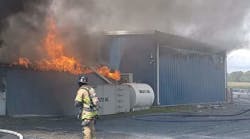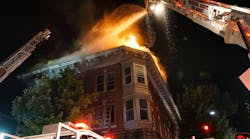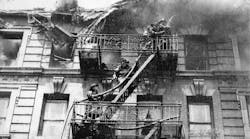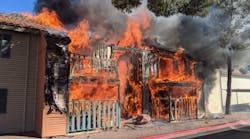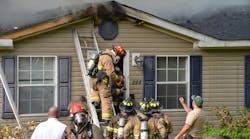Two contract firefighters back from Iraq have reported a lack of basic firefighting equipment, resulting in unsafe working conditions that have left both with apparent health effects.
Employer Wackenhut Services Inc. said the problems these firefighters encountered have since been remedied and that the company is meeting the monumental challenges of operating in Iraq as best as possible.
However, one of the firefighters has filed a formal complaint with the Department of Labor.
Firefighter Shane Shifflett of White Sands, New Mexico, was a federal firefighter with the Department of Defense at the White Sands missile range before heading to Iraq, and now works as a part time EMT in El Paso, Texas. He left for Iraq in July and was among the first groups of contract firefighters to arrive there, he said.
He was stationed in Mosul, where 16 firefighters only had three sets of gear, he said. The small-sized protective equipment only fit three of the firefighters anyway so the same three had to do all of the hazardous work, Shifflett said.
Shifflett added that his mask was an ill-fitting size large rather than small, and after his gloves were destroyed by acid, he had to make do with gardening gloves.
"I'm used to having the right equipment to do the job. There you just have to improvise," he said.
The improvisation was particularly dangerous considering the conditions in Iraq. Shifflett fought two major fires and reported, "Two of us got injured on the second fire because of the improper gear."
When a mortar hit an air-conditioned warehouse storing ammunition, three Army soldiers were killed, 42 explosions ensued and freon from the air conditioners was released. "Freon turns into mustard gas and I believe that's what we breathed in that night," he said.
Shifflett said he suffered smoke inhalation and an upper respiratory infection, damage to the inner lining of his lungs, and now experiences chest pain. He said he is seeing a doctor to determine whether he will have any lasting or future health problems due to possible mustard gas or radiation exposure.
He returned home from Iraq in November.
Firefighter Bryan Malis of Montana Vista Fire Rescue in El Paso County, Texas traveled to Iraq in the same group as Shifflett. He was told that personal protective equipment, measured to fit each firefighter, would be two weeks behind them but it still hadn't arrived by the time he left in October.
He said 30 firefighters at Camp Victory had five sets of gear to share. He had to borrow boots and bunker pants so big that he would be exhausted by the time he got to the scene, he said, and he had to hold his pants up while he worked.
As a U.S. military veteran he's used to difficult conditions, he said, "But I'm not used to not having the gear I'm supposed to have. I was always without air protection and ill-fitting PPE."
When SCBA's did arrive at Camp Victory, Malis said firefighters still couldn't use them because they couldn't refill them, and he now experiences a chronic cough.
WSI Senior Project Manager for Homeland and International Security Services, Thomas Keller, said the company has indeed faced challenges and that it's necessary to consider the circumstances under which they must operate.
"Early on when you start up any program you're going to have logistical challenges, regardless of whether it's in the military or civilian sector," Keller said. "Logistics has been a challenge across the board."
He said WSI paused their shipment of personnel in August to give the shipments of equipment, including fire engines, time to catch up.
"When you move in major items, which we don't control but is being shipped across sea, it takes time to get there and has to get to the port of Kuwait," he said. From there WSI has to coordinate inspections and shipments, taking into consideration safety and security. "Certainly those are some of the challenges that you're facing," Keller said.
So, are all the firefighters now getting gear in their own sizes?
"We still have some challenges in that particular area," Keller said.
"What we do now is try to airlift all of those items as opposed to ocean freight. That has helped considerably, but we are going back to re-address the PPE issue and how we can look at another means to get it there quicker," he said. "It has to do with production, it has to do with shipment, it has to do with the right sizes. All of those are challenges, but we feel that we can accommodate operationally the mission on the ground based on the flow of equipment and personnel.
"It's a daily challenge," he said. "We don't take it lightly and we understand the seriousness of it, but more from a safety and security perspective."
Shifflett and Malis reported other employment issues as well. For example, they were told they would have the opportunity to obtain DOD certification for further firefighter and officer training, but received only short, informal presentations.
Keller said the training certification program went into effect in mid November, so it is available for current and future firefighters.
"You've got to understand when you're starting up a new program it takes time, from equipment, to personnel, to training, to logistics," he said. "These are start up programs from the ground up."
Shifflett and Malis also said that WSI was not being selective enough in their hiring of firefighters.
Malis said some of the new recruits coming in to Camp Victory were dangerously out of shape, and that the required agility test was a joke.
"We got their test scores, and we had one guy that couldn't even do a single sit up and another guy that couldn't do a single push up, and yet they hired them," Malis said.
Keller said all the firefighters took the agility test before they were hired, which required them to do push ups, sit ups, a 50-yard run and a fireman's carry. "We don't bring on anyone unless they are a certified firefighter," he said.
Because of these and other issues they experienced, Shifflett and Malis said they would never consider going back to work in Iraq.
"I could talk about it for hours," Shifflett said.
"I don't recommend anyone going back there, the money wasn't worth it."
Malis said the experience did not pay off for him because he was unable to complete his service there. After a leave in October, his plane ticket from the U.S. back to Iraq was cancelled without explanation. He had already traveled the first leg of the trip to Boston, and after four days of fruitless phone calls, had to write a bad check to Delta to get back home. He said he has also been unable to get his personal property mailed back from Iraq. He believes he may have been refused his job back because he was relaying his concerns to others in the U.S.
According to Keller, however, working conditions and opportunities in Iraq are continuously improving as the operation builds.
"Our firefighters are doing an exceptional job for us at the military bases in Iraq," Keller said. "It's a great team effort. They are representing themselves, their families and their communities well, and our nation."
Keller said contract firefighters are still needed in Iraq. According to WSI's recruitment web site, "Life in Iraq is challenging and is not for all firefighters, however, for those who have what it takes to operate in a combat region it can be one of the most personal and professionally rewarding experiences in a lifetime."
Related:
Wackenhut Services Inc. Iraq Fire Protection